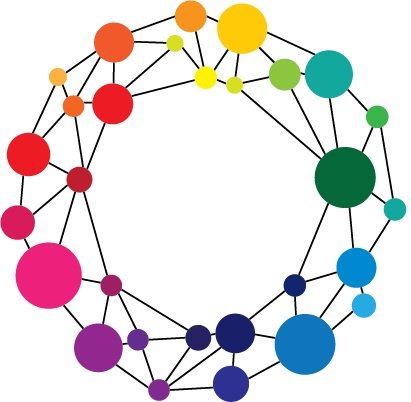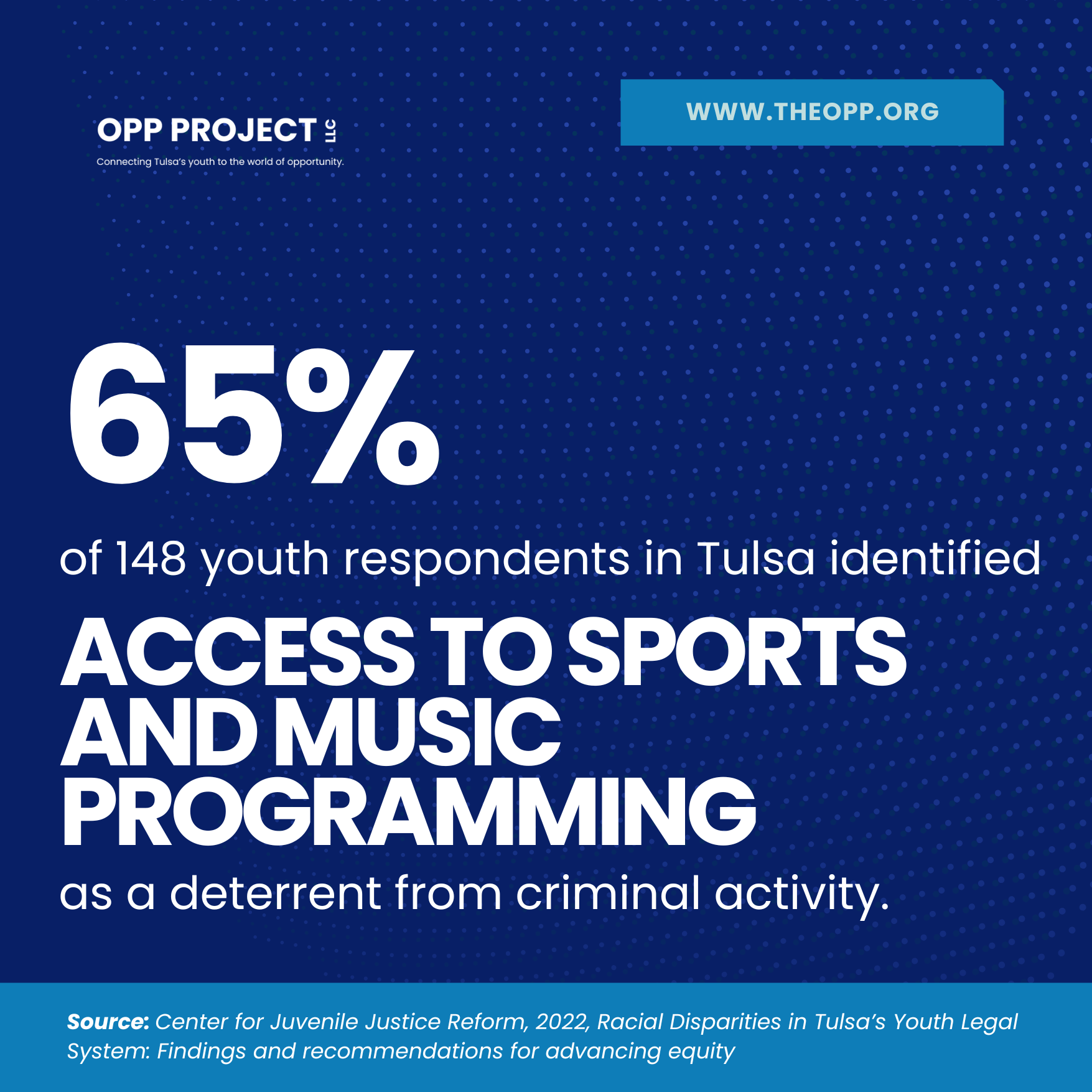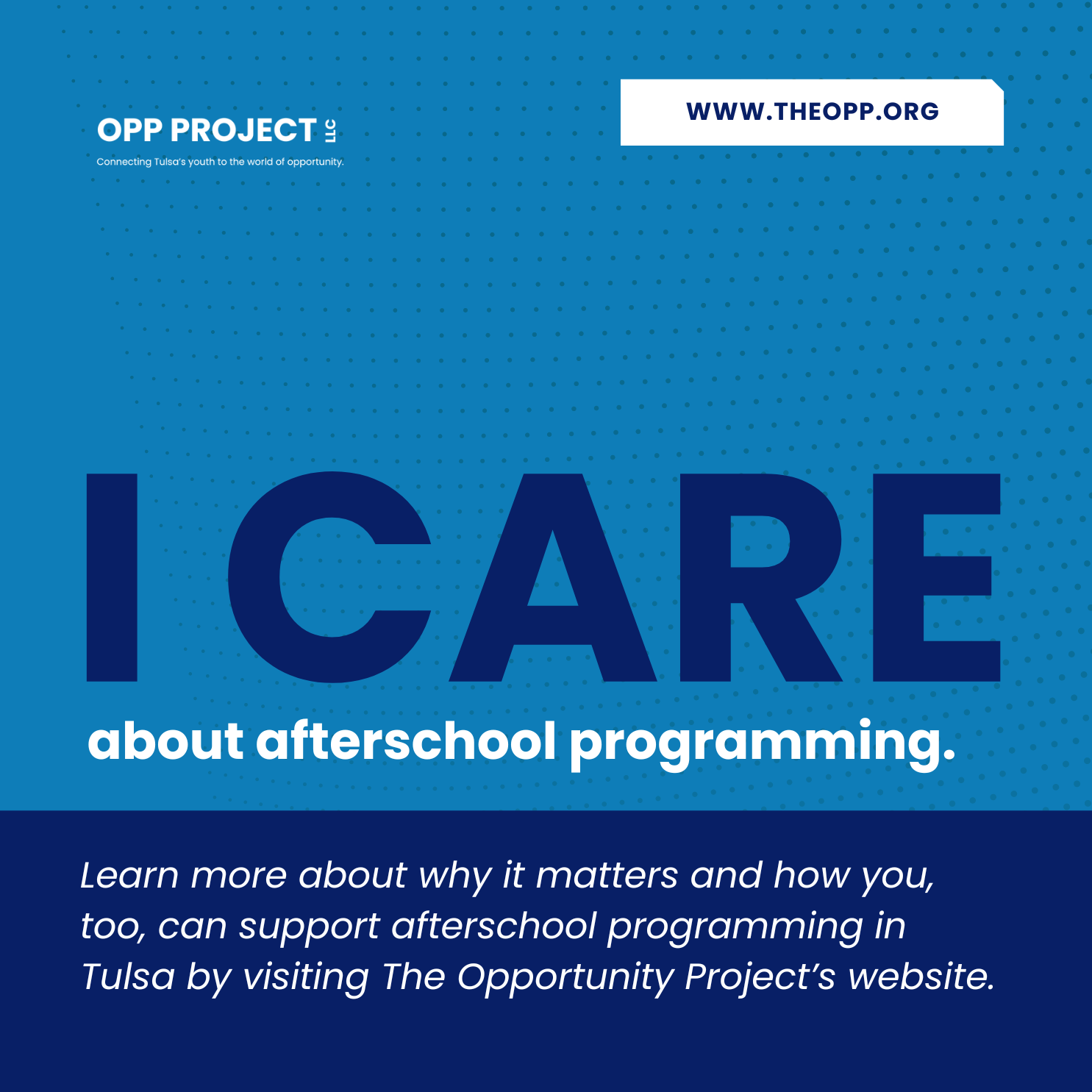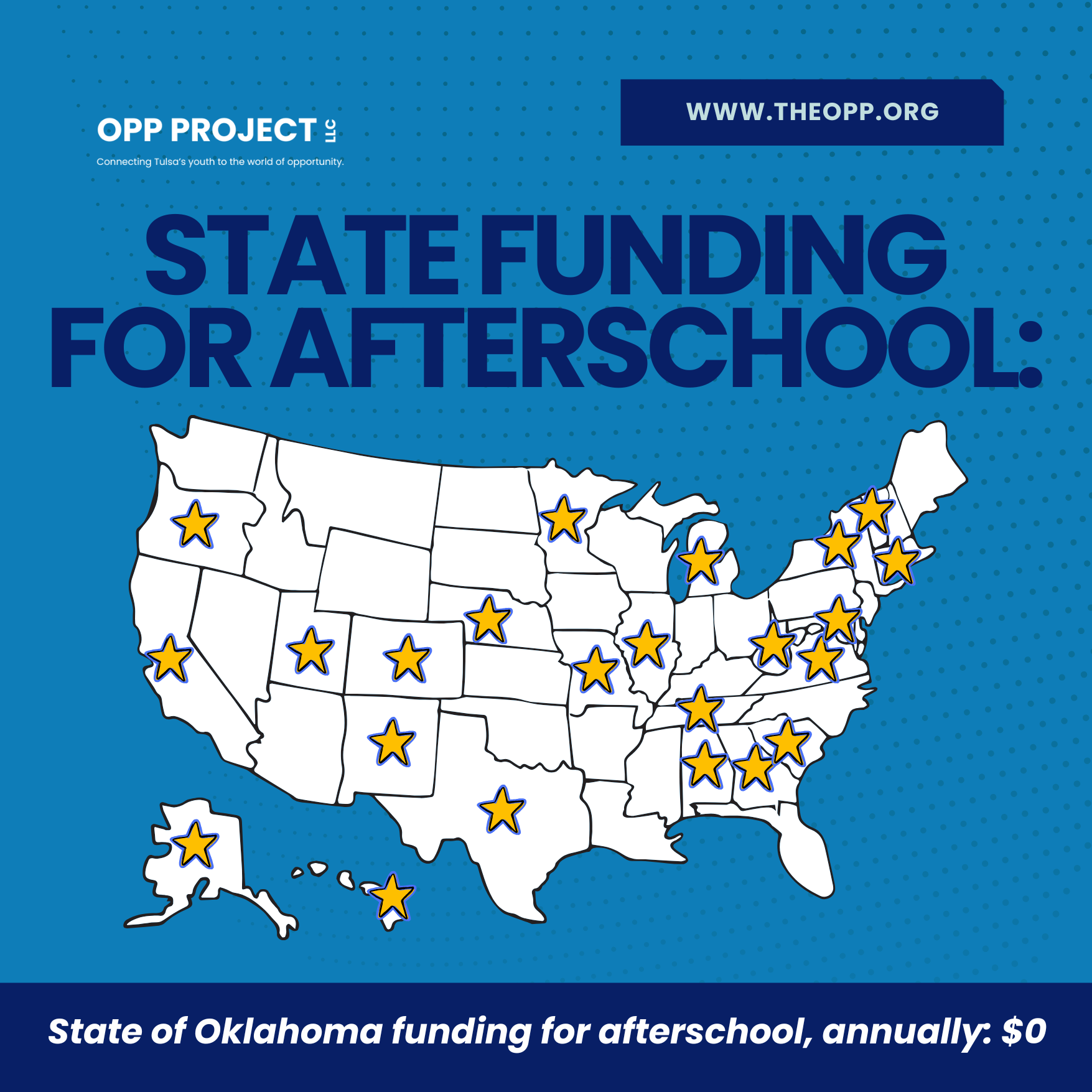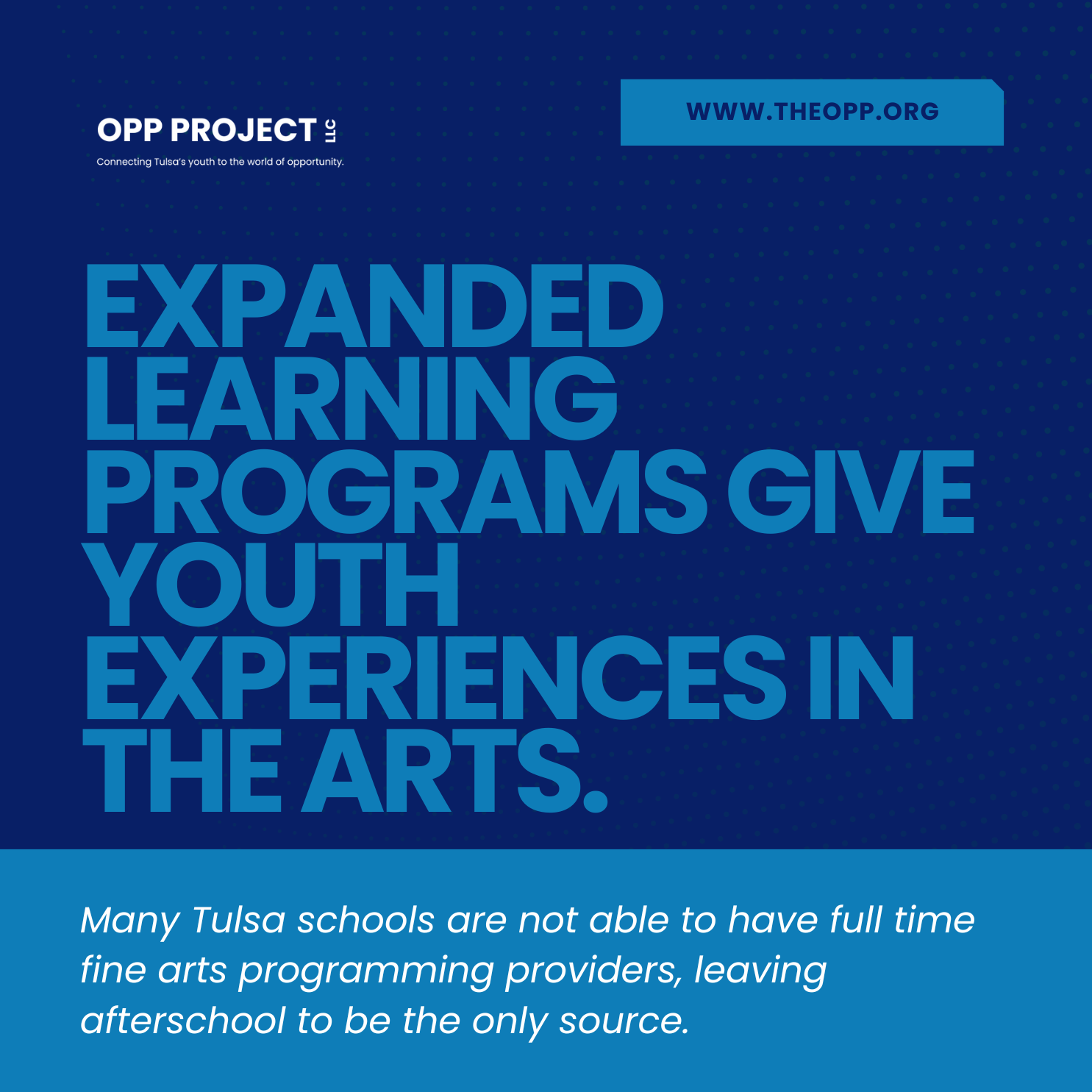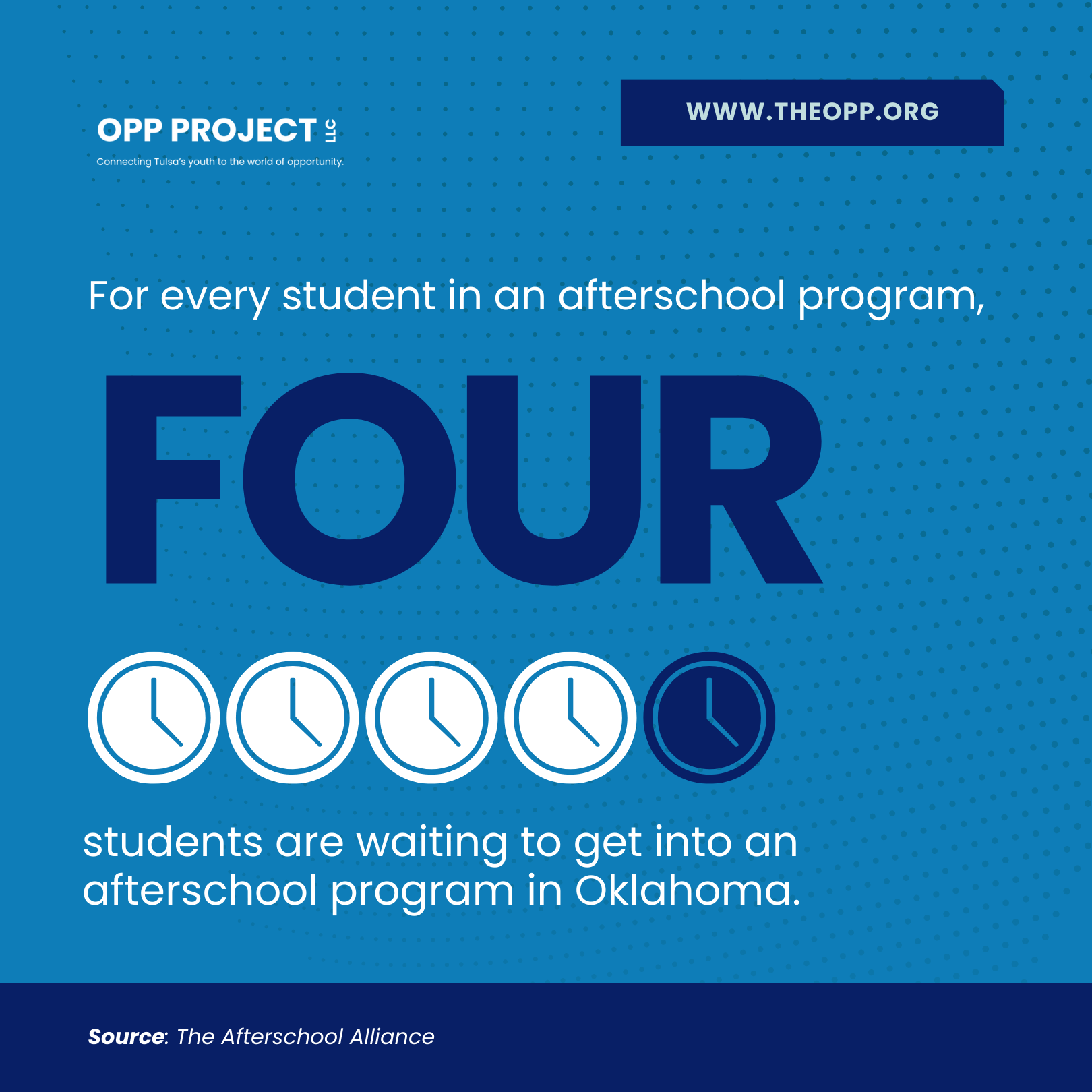#OSTTulsa Advocacy Toolkit
According to Tulsa’s Integrated Data-System for Expanded Learning (TIDEL), more than 9,000 youth are currently engaged in expanded learning programs across the city—nearly matching pre-pandemic levels. However, since the expiration of ESSER (pandemic relief) funds in October 2024, no dedicated federal, state, or city funding source has stepped in to sustain this level of access.
We need your help to raise awareness about the importance of continued public investment in expanded learning at every level of government, from local to state to federal.
Below, you’ll find messaging ideas, hashtags, and shareable graphics to use on your social media pages. Whether you want to post online, share information with your community, or set up a conversation with a decision-maker, your voice matters.
All forms of advocacy are welcome—and needed.
-
Proposed changes to federal education funding will significantly impact afterschool and summer programs in Tulsa and across Oklahoma. One of the largest shifts under consideration would eliminate dedicated funding for the 21st Century Community Learning Centers (21st CCLC) initiative—the primary federal investment supporting out-of-school time programs. In Oklahoma, 21st CCLC currently funds dozens of programs that serve thousands of students in communities ranging from rural districts to urban centers like Tulsa. These programs offer academic enrichment, social and emotional learning, family engagement, and critical supervision during non-school hours.
With these changes, many local programs may be forced to scale back or close entirely, leaving students and families with fewer affordable, high-quality options. In Tulsa, where out-of-school learning is a key part of efforts to boost attendance, academic achievement, and family stability, this shift could have far-reaching implications. We remain committed to advocating for sustained investment in expanded learning opportunities and will continue to share updates on how federal policy decisions may affect Oklahoma’s youth and the local organizations working to support them.
-
Help us amplify these key points as you post:
—Pandemic relief funds, including ESSER, have been instrumental in expanding Out-of-School Time opportunities in Tulsa. These funds ran out in October 2024.
—Youth who participated in ESSER-funded Afterschool and Summer programs here in Tulsa had higher attendance rates and higher test scores
—8 in 10 school districts used ESSER funds to invest in Afterschool
—5 million more youth nationally had new learning opportunities because of ESSER funds
—87% of parents say that ESSER-funded Afterschool helped their kids academically (Idaho)
—Because of pandemic relief funds, nearly 90% of schools now offer Afterschool programming (Youth Today)
—School districts with high poverty levels will feel the fiscal cliff of losing ESSER funds more (Brookings)
—ESSER-funded summer programming in Tulsa prevented the summer slide (the tendency of students to lose some of the achievement gains that they made during the previous school year)
-
Use the below hashtags any time you post about your advocacy on social media to help us track our community’s efforts.
#OSTtulsa
#BecauseOfTheOpp
#KeepFundingAfterschool
#SustaintheFunding
#KeepYouthEngaged
#FinishtheJob
#ExpandedLearningWorks
#InvestinOST
-
Follow The Opportunity Project (@theopptulsa) and the Oklahoma Partnership for Expanded Learning (@opel_ok) and share posts from our accounts that speak to you and your family or community. You can send them to your friends directly, or post them to your story.
It’s also a wonderful idea to share photos from your children’s afterschool programs if applicable for you or your family.
Alternatively, you can share any (and all!) of the posts we have prepared linked here and found at the bottom of this page as well.
Feel free to also use the messaging as provided in the “Talking Points” tab above.
Using 7-10 hashtags should help get more eyes on your message; find ideas in the “Our Hashtags” tab above!
-
Follow The Opportunity Project and the Oklahoma Partnership for Expanded Learning.
Consider sharing any posts that speak to you, your family, or your community’s journey. If you have a child in an afterschool program or you yourself benefitted from out-of-school-time activities, share those stories too!
Post images such as the ones linked here and found at the bottom of this page as well.
Feel free to also use the messaging as provided in the “Talking Points” tab above.
Be sure to use the hashtags in the “Our Hashtags” tab above, too!
Always feel free to tag your lawmakers in the post by using the “@” symbol before typing their name (or the name of their Facebook page).
-
Follow The Opportunity Project (@TheOppTulsa) and The Oklahoma Partnership for Expanded Learning (@OPEL_OK) and retweet posts from each account that speak to you, your family, or your community.
When retweeting, be sure to tag your legislators.
Tweet images such as the ones linked here and found at the bottom of this page as well.
Feel free to also use the messaging as provided in the “Talking Points” tab above.
Be sure to use the hashtags in the “Our Hashtags” tab above, too!
-
Linked here in English and here in Spanish, you will find our advocacy letter including steps to help us advocate for public support of expanded learning as well as call a letter template and phone script to make this process even quicker and easier!
To find your legislators, visit this link.
-
First, find your State Senator and State Representative by typing in your address here.
Next, decide how you want to reach out. You may want to email, call, or schedule a meeting with them.
Before you reach out, you can read up on how to be an effective advocate by visiting OPEL’s advocacy toolkit here.
We need funding for high-quality Out-of-School Time programming included in the State Budget. Just as OPEL suggests, it can be very effective for you to include a personal story of why OST programming is important to your family, in your life, or in your community.
-
First, find your city council member by typing in your address here.
Next, decide how you want to reach out. You may want to email, call, or schedule a meeting.
Before you reach out, you can read up on how to be an effective advocate by visiting OPEL’s advocacy toolkit here.
We need funding for high-quality Out-of-School Time programming to be included in the City Budget. Just as OPEL suggests, it can be very effective for you to include a personal story of why OST programming is important to your family, in your life, or in your community.
-
First, find your school district by reviewing this map. Then, find your district’s school board member at this link.
Next, decide how you want to reach out. You may want to email, call, or schedule a meeting.
Before you reach out, you can read up on how to be an effective advocate by visiting OPEL’s advocacy toolkit here.
We need school board members to approve contracts that expand Out-of-School Time programming through our local intermediary (that’s us!) and community-based groups.
-
Expiration of Federal K-12 Emergency Funds Could Pose Challenges for States by the Center on Budget and Policy Priorities
Schools face a funding cliff. How bad will the fall be? by Chalk Beat
Running Out of Time: ESSER Spending Deadline Looms and Fiscal Cliffs Approach by The Education Trust’
How ESSER propelled improvements at school, district and state levels by K-12 Dive
Ever wondered where to draw the line when it comes to advocacy as a 501(c)(3) organization?
Advocacy can be a very important component of nonprofit work! Here at the Opp, we work to advocate alongside the larger Expanded Learning community in Tulsa.
Although there are certainly limits to this advocacy, there are so many options still available to us to as 501(c)(3)s to move the needle.
